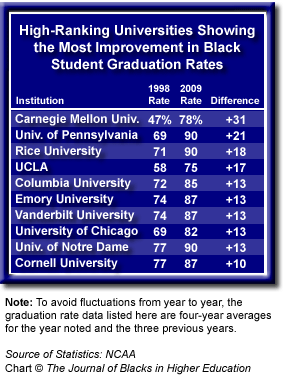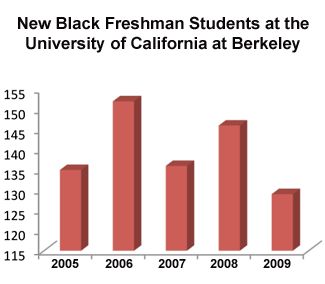Trends in Black Student Graduation Rates at Highly Ranked Universities
Here is some very good news! Of the 26 selective universities with high academic rank for which JBHE has long-term college completion data, the black graduation rate has improved at 23 institutions. At the other three universities, the black graduation rate has remained at the same high rate.
The greatest improvement in the black student college graduation rate occurred at Carnegie Mellon University in Pittsburgh. There, the four-year average black graduation rate rose from 47 percent in 1998 to 78 percent in 2009. There has been an 11 percentage point gain at Carnegie Mellon over the past three years alone.
Similarly impressive gains in black student graduation rates occurred at the University of Pennsylvania, Rice University, UCLA, Columbia University, Emory University, the University of Chicago, and Vanderbilt University. Each university has seen its black student graduation rate improve by at least 13 percentage points over the 11-year period from 1998 to 2009.

Public University Systems Pledge to Cut Racial Disparities in Enrollment and Graduation Rates by 2015
 A new report by The Education Trust and the National Association of System Heads finds a significant difference in the percentage of minority students graduating from high school in 21 states and the percentage of minorities entering and graduating from four-year colleges and universities in those same states. The study found that underrepresented minority students — African Americans, Hispanics, and American Indians — accounted for 36 percent of all high school graduates in the 21 states. But only 29 percent of the freshmen enrolling in the state university systems in those states were members of minority groups. A new report by The Education Trust and the National Association of System Heads finds a significant difference in the percentage of minority students graduating from high school in 21 states and the percentage of minorities entering and graduating from four-year colleges and universities in those same states. The study found that underrepresented minority students — African Americans, Hispanics, and American Indians — accounted for 36 percent of all high school graduates in the 21 states. But only 29 percent of the freshmen enrolling in the state university systems in those states were members of minority groups.
The overall graduation rate for students in the state university systems in these 21 states is 53 percent. For underrepresented minorities, the graduation rate is 44 percent.
The leaders of the public university systems in these 21 states have pledged to cut in half the gaps in college access and graduation rates by the year 2015.
The University of Phoenix Has Become a Major Bulwark of African-American Higher Education
 Founded in 1976, the University of Phoenix is now the largest private university in North America. This fall there were 443,000 students enrolled in its more than 100 undergraduate and graduate degree programs. A large part of the university’s enrollment is made up of so-called nontraditional students. Many of these are working adults. While the university maintains 200 campus locations nationwide, a significant portion of University of Phoenix students conduct much of their college work online. Founded in 1976, the University of Phoenix is now the largest private university in North America. This fall there were 443,000 students enrolled in its more than 100 undergraduate and graduate degree programs. A large part of the university’s enrollment is made up of so-called nontraditional students. Many of these are working adults. While the university maintains 200 campus locations nationwide, a significant portion of University of Phoenix students conduct much of their college work online.
In a new report on its student demographics, the University of Phoenix reports that African Americans make up a whopping 30 percent of all university enrollments. This is up from 23 percent in 2007. Therefore, there are more than 130,000 African Americans who are students at the University of Phoenix. About 6 percent of all African Americans enrolled in higher education nationwide are University of Phoenix students.
Blacks make up 11 percent of the faculty of the University of Phoenix. This is more than twice the national average.
After Only Two Years, George Ross Gives Up Presidency of Alcorn State University to Take the Helm at Central Michigan University
 George E. Ross, who has served as president of historically black Alcorn State University in Mississippi since January 2008, has announced that he has accepted the position as the 14th president of Central Michigan University in Mount Pleasant. He will be the first African American to serve as president of Central Michigan University. Central Michigan University has a total enrollment of more than 27,000 students. About 6 percent of the undergraduate students are black. George E. Ross, who has served as president of historically black Alcorn State University in Mississippi since January 2008, has announced that he has accepted the position as the 14th president of Central Michigan University in Mount Pleasant. He will be the first African American to serve as president of Central Michigan University. Central Michigan University has a total enrollment of more than 27,000 students. About 6 percent of the undergraduate students are black.
Dr. Ross, who will assume his new position in March, holds bachelor’s and master’s degrees from Michigan State University. He earned a doctorate at the University of Alabama. Before becoming president of Alcorn State University, Dr. Ross served as vice president for finance and administrative services at Central Michigan University. He has also held administrative positions at Clark Atlanta University, Tuskegee University, and the University of Tennessee at Chattanooga.
A native of Flint, Michigan, Ross stated that his decision to leave Alcorn State University had nothing to do with Mississippi Governor Haley Barbour’s controversial proposal to merge Alcorn State with Jackson State University.
Black College in Florida Opens New Family Medical Center
 Edward Waters College, the historically black educational institution in Jacksonville, Florida, has recently opened its Family Medical Center. Previously the only medical practitioner stationed at the college was a volunteer nurse who treated minor ailments. Students with more serious conditions were sent to the emergency room at a local hospital. Edward Waters College, the historically black educational institution in Jacksonville, Florida, has recently opened its Family Medical Center. Previously the only medical practitioner stationed at the college was a volunteer nurse who treated minor ailments. Students with more serious conditions were sent to the emergency room at a local hospital.
Now two primary-care physicians staff the new clinic. The clinic is free to students under the college’s insurance plan. The general public is also invited to use the facility with rates determined by the individual’s insurance plan. The clinic accepts Medicare and Medicaid patients. It will also offer internships to Edward Waters College students who are contemplating careers in the healthcare industry.
  |
75.4% Percentage of all white doctoral degree recipients in 2008 who previously had earned a master’s degree.
83.7% Percentage of all African-American doctoral degree recipients in 2008 who previously had earned a master’s degree.
source: U.S. Department of Education
|
A New Editor for the Humanities Journal, The Caribbean Writer
 Opal Palmer Adisa was named editor of The Caribbean Writer, a humanities journal that includes fiction, essays, poetry, and profiles of Caribbean writers. The journal is published by the Research and Public Service division of the University of the Virgin Islands in St. Thomas. Opal Palmer Adisa was named editor of The Caribbean Writer, a humanities journal that includes fiction, essays, poetry, and profiles of Caribbean writers. The journal is published by the Research and Public Service division of the University of the Virgin Islands in St. Thomas.
Dr. Adisa, a native of Jamaica, will also serve on the faculty of the university. She previously was a professor of writing at the California College of the Arts in San Francisco. She has also taught at Stanford University, the University of California at Berkeley, and San Francisco State University.
Dr. Adisa is a graduate of New York University. She holds a master’s degree from San Francisco State University and a Ph.D. from the University of California at Berkeley. She is the author of 11 books, including the 1997 novel It Begins With Tears.
Bucknell University Professor Sentenced to Death by an Ethiopian Court
 Berhanu Nega, associate professor of economics at Bucknell University in Lewisburg, Pennsylvania, was sentenced in absentia to death by a court in Ethiopia. Nega’s alleged crime was that he conspired to assassinate government officials during violence that followed elections in the East African country in 2005. Berhanu Nega, associate professor of economics at Bucknell University in Lewisburg, Pennsylvania, was sentenced in absentia to death by a court in Ethiopia. Nega’s alleged crime was that he conspired to assassinate government officials during violence that followed elections in the East African country in 2005.
A native of Ethiopia, Nega immigrated to the United States in 1980. He graduated from the State University of New York at New Paltz and went on to earn a Ph.D. in economics at the New School in New York City. He joined the faculty at Bucknell in 1990. Four years later he returned to Ethiopia to teach at Addis Ababa University. There he became involved in the democracy movement and in 2005 was elected mayor of the capital city of Addis Ababa. After the election, Nega and 100 opposition leaders were rounded up after the election and jailed. He remained in prison for 21 months and was then exiled to the United States. He rejoined the faculty at Bucknell.
Appointments, Promotions, and Resignations
 • Enrico Riley was appointed assistant professor of studio art at Dartmouth College. An abstract painter, Riley held a John Simon Guggenheim Memorial Foundation Fellowship. • Enrico Riley was appointed assistant professor of studio art at Dartmouth College. An abstract painter, Riley held a John Simon Guggenheim Memorial Foundation Fellowship.
A 1995 graduate of Dartmouth, Riley earned a master’s of fine arts degree in painting from Yale University.
 • Larry P. Thomas was named inaugural director of the Frederick Douglass Distinguished Scholars Program at American University in Washington, D.C. Previously, he served as director of the Collegiate Science and Technology Entry Program at Syracuse University. • Larry P. Thomas was named inaugural director of the Frederick Douglass Distinguished Scholars Program at American University in Washington, D.C. Previously, he served as director of the Collegiate Science and Technology Entry Program at Syracuse University.
Thomas holds a bachelor’s degree in psychology from Rowan University and a master’s degree in higher education administration from Syracuse University, where he is currently pursuing an MBA.
 • Toni Stokes Jones was promoted to professor of educational media and technology at Eastern Michigan University in Ypsilanti. • Toni Stokes Jones was promoted to professor of educational media and technology at Eastern Michigan University in Ypsilanti.
Dr. Jones holds bachelor’s, master’s, and doctoral degrees from Wayne State University in Detroit.
• Uva Coles was appointed dean of career management services at Peirce College in Philadelphia. A graduate of Claflin University in South Carolina, Coles was a vice president of Big Brothers/Big Sisters of Philadelphia.
 • Ronald H. Blackmon was named interim provost and vice president of academic affairs at Delaware State University in Dover. He was provost and vice chancellor for academic affairs at Elizabeth City State University in North Carolina from 2005 to 2008. • Ronald H. Blackmon was named interim provost and vice president of academic affairs at Delaware State University in Dover. He was provost and vice chancellor for academic affairs at Elizabeth City State University in North Carolina from 2005 to 2008.
Dr. Blackmon is a graduate of Delaware State University. He holds a master’s degree in zoology and a Ph.D. in cell biology from Howard University.
 • Lisa M. Coleman was named chief diversity officer and special assistant to the president at Harvard University. She was the chief diversity officer at Tufts University in Medford, Massachusetts. • Lisa M. Coleman was named chief diversity officer and special assistant to the president at Harvard University. She was the chief diversity officer at Tufts University in Medford, Massachusetts.
Dr. Coleman is a graduate of Dennison University in Granville, Ohio. She holds a master’s degree from Ohio State University and a Ph.D. from New York University.
|

  |
“If you fight for democracy, we will kill you; that is the message they are saying.”
— Berhanu Nega, associate professor of economics at Bucknell University, reacting to the news that he had been sentenced to death by an Ethiopian court, in the Philadelphia Inquirer, 12-23-09 (See story below.)
|
Washington and Lee University and Brown University Are the Latest Partners in the QuestBridge Program for Low-Income Students
 The QuestBridge National College Match Program seeks out qualified low-income students of all races who seek admission to selective colleges and universities. There are 27 colleges and universities that have joined the QuestBridge program. Brown University and Washington and Lee University are the newest additions to the list of partner institutions. The QuestBridge National College Match Program seeks out qualified low-income students of all races who seek admission to selective colleges and universities. There are 27 colleges and universities that have joined the QuestBridge program. Brown University and Washington and Lee University are the newest additions to the list of partner institutions.
Here’s how the QuestBridge program matches low-income students with partner colleges. Students participating in the college match process complete one application by September 30 and use it to apply early to up to eight of QuestBridge’s 27 partner colleges, ranking the schools in order of preference. The rankings are binding. Students agree to attend the school highest on their ranking list that admits them. The admitted students receive full-tuition scholarships. Last year, 260 QuestBridge applicants who participated in the college match process were selected, gaining admission and full scholarships to one of the partner colleges.
About one quarter of all students who receive scholarships under the QuestBridge National College Match program are African Americans.
Berkeley’s Ongoing Struggle With Black Enrollments
It has now been more than a decade that the University of California at Berkeley has been prohibited by state law from considering race in its admissions decisions. Despite increased outreach efforts and a new holistic admissions procedure that takes in an applicant’s entire life experience, not just grades and SAT scores, the number of black students at Berkeley hovers near about one half the level that existed prior to the ban on race-sensitive admissions.
In fact, the latest data shows that the number of new black freshmen at Berkeley is the lowest level since 2004. There are 129 black freshman students on the Berkeley campus this year, down from 146 a year ago. Blacks make up 3.2 percent of this year’s freshman class.
There are 923 blacks enrolled as undergraduates on the Berkeley campus. They make up 3.6 percent of the undergraduate student body. There are 330 black graduate students at Berkeley. They comprise 3.2 percent of the graduate student population.

Four African Americans Awarded Harvard University’s W.E.B. Du Bois Medal
 Earlier this month the W.E.B. Du Bois Institute for African and African-American Research at Harvard University awarded its highest honor, the W.E.B. Du Bois Medal, to eight individuals. The medal is awarded to individuals of any race who have made a significant contribution to African-American culture. Here are this year’s four African-American winners: Earlier this month the W.E.B. Du Bois Institute for African and African-American Research at Harvard University awarded its highest honor, the W.E.B. Du Bois Medal, to eight individuals. The medal is awarded to individuals of any race who have made a significant contribution to African-American culture. Here are this year’s four African-American winners:
• Bob Herbert, op-ed columnist at The New York Times;
• Hugh M. “Brother Blue” Hill, the late performance artist and playwright;
• Charlayne Hunter-Gault, the journalist who was one of the first two black students at the University of Georgia; and
• Vernon E. Jordan, former head of the National Urban League and adviser to President Clinton, who is now senior managing director at Lazard Freres & Co.
Other honorees were philanthropists Frank H. Pearl, Daniel Rose and Joanna S. Rose, as well as Princeton University President Shirley M. Tilghman.
The First Black Studies Graduate at the University of Connecticut
 Paula McFarlane graduated from the University of Connecticut this month. She is the first person to graduate from the university with a degree in African-American studies. In 2007 McFarlane spent a semester on the schooner Amistad, traveling to countries such as England and Portugal, learning about the trans-Atlantic slave trade. When she returned to Connecticut, she found out that the university had instituted an African-American studies major. McFarlane, who had completed a minor in the subject, was able to satisfy the major requirements in just one year. During her senior year, McFarlane also gave birth to a baby girl. Paula McFarlane graduated from the University of Connecticut this month. She is the first person to graduate from the university with a degree in African-American studies. In 2007 McFarlane spent a semester on the schooner Amistad, traveling to countries such as England and Portugal, learning about the trans-Atlantic slave trade. When she returned to Connecticut, she found out that the university had instituted an African-American studies major. McFarlane, who had completed a minor in the subject, was able to satisfy the major requirements in just one year. During her senior year, McFarlane also gave birth to a baby girl.
She is applying to master’s degree programs in public policy at the University of Connecticut and Brown University.
Mississippi State University Receives Papers of Civil Rights Leader
 Dorothy Bishop, who since the age of 17 has been a leading figure in the Mississippi civil rights movement, is donating her papers to the special collections department of the Mitchell Memorial Library on the campus of Mississippi State University in Starkville. The papers include correspondence and records from Bishop’s 12-year tenure as adviser for the Youth Chapter of the NAACP and as the first woman president of the Oktibbeha County NAACP. The documents relate to voting rights, NAACP member recruiting, fundraising, and program planning. Dorothy Bishop, who since the age of 17 has been a leading figure in the Mississippi civil rights movement, is donating her papers to the special collections department of the Mitchell Memorial Library on the campus of Mississippi State University in Starkville. The papers include correspondence and records from Bishop’s 12-year tenure as adviser for the Youth Chapter of the NAACP and as the first woman president of the Oktibbeha County NAACP. The documents relate to voting rights, NAACP member recruiting, fundraising, and program planning.
Faculty Votes No Confidence in African-American President of Indiana University of Pennsylvania
 The faculty of Indiana University of Pennsylvania, the largest of the 14 universities in the state system, has issued a vote of no confidence in the leadership of President Tony Atwater. The vote was overwhelming against President Atwater with 84 percent of the faculty supporting the no-confidence measure. The faculty of Indiana University of Pennsylvania, the largest of the 14 universities in the state system, has issued a vote of no confidence in the leadership of President Tony Atwater. The vote was overwhelming against President Atwater with 84 percent of the faculty supporting the no-confidence measure.
The faculty listed their grievances as including poor decision making, a leadership style that alienates various segments of the campus community, and questionable spending priorities. The head of the faculty union said that Dr. Atwater has been uncooperative in attempting to find a solution to their list of grievances. President Atwater said in a statement, before the results of the vote were announced, that the criticisms of his leadership were based on “inaccuracies and misleading information.”
Before becoming president of Indiana University of Pennsylvania in 2005, Dr. Atwater was provost and vice president for academic affairs at Youngstown State University in Ohio. A 1973 graduate of Hampton University, President Atwater holds a Ph.D. in communication research from Michigan State University.
The university, which is east of Pittsburgh, has about 12,000 undergraduate students, 11 percent of whom are black.
In Memoriam
Lathardus Goggins (1930-2009)
Lathardus Goggins, longtime professor of geography and associate dean of the graduate school at the University of Akron, died earlier this month from pancreatic cancer. He was 79 years old.
Dr. Goggins was the first African-American professor at the University of Akron to serve on the faculty for 30 years. He retired in 2005.
Professor Goggins was a native of Alabama. He was a graduate of Central State University and held a master’s degree from Ohio State University and a doctorate from St. John’s University. Before joining the faculty at the University of Akron, he taught at the State University of New York at Plattsburg, Grambling State University, and Florida A&M University.
Honors and Awards
 • Ally Mack, professor and dean of international studies at Jackson State University in Mississippi, received the Excellence in Trade Education Award from the Mississippi World Trade Center. • Ally Mack, professor and dean of international studies at Jackson State University in Mississippi, received the Excellence in Trade Education Award from the Mississippi World Trade Center.
 • Lisa A. Dunning, director of the College of Business Advisement Center at Delaware State University, received the Rising Star Award from the Office of Women in Higher Education of the American Council on Education. • Lisa A. Dunning, director of the College of Business Advisement Center at Delaware State University, received the Rising Star Award from the Office of Women in Higher Education of the American Council on Education.
Dunning holds a bachelor’s and MBA degree from Delaware State University. She is currently pursuing a doctorate in business administration from Wilmington University.
Grants and Gifts
• Emerson College in Boston, Massachusetts, received a $100,000 grant from the William Randolph Hearst Foundation. The money will be placed in a scholarship endowment for minority students.
• Hampton University, the historically black educational institution in Virginia, received a $147,749 grant from the State Council for Higher Education of Virginia to fund a professional development program. Hampton faculty will work with teachers from public and private high schools to improve science teaching techniques.
|